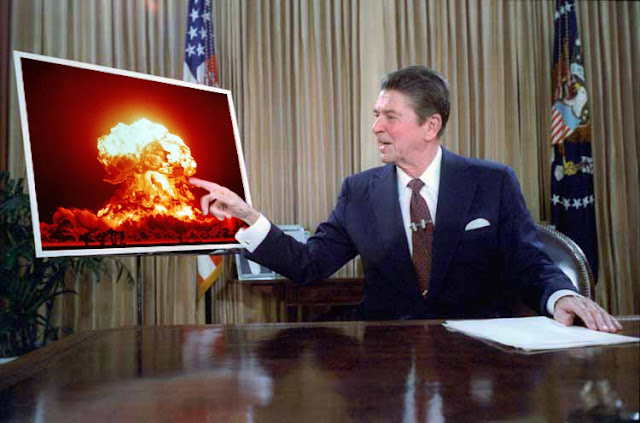In fact, there was one situation that was arguably a closer brush with the proverbial Midnight. That one you probably remember reading about. It involved Cuba. And missiles. And a crisis.
 |
| And aerial reconnaissance photos that mean nothing to the untrained eye |
The Cuban Missile Crisis started because Fidel Castro was sick of the CIA trying to topple his fledgling Communist nation, and Nikita Kruschev wanted to make the U.S. sweat. See, the so-called "missile gap" was an actual thing. But it was a thing that almost comically favored America. The Soviet Union really didn't even have the capability to strike most of the United States from a distance, whereas the United States had both a wealth of ICBMs and missile sites in Turkey, close enough to nuke the baldness off of the Soviet Premier.
So Kruschev sent some nukes to Cuba. When the U.S. noticed, the world started to figuratively explode with the fear that it would soon literally explode. The U.S. Joint Chiefs of Staff unanimously advised President Kennedy to invade Cuba. Let that sink in. Such a decision would absolutely, unequivocally guarantee that the U.S.S.R. would, at the very least, invade West Berlin. And that action would almost as certainly lead to a nuclear reprisal from NATO.
 |
| Shit. Is. On. Fire. |
In short, the U.S. Joint Chiefs of Staff were, with one voice, telling Kennedy that it was time to end the world. Kennedy thought maybe we should try a few other solutions first. The compromise was a naval "quarantine," which is like a blockade but you get to not use the word "blockade," because that's defined as an act of war by international law.
At some point, the ships of this blockade announced that they would be dropping practice depth charges on Soviet submarines. They weren't powerful enough to cause severe damage, but they would usually force a submarine to surface, negating its stealthy advantage. Somehow, the Soviet Foxtrot-class submarine B-59 didn't get the memo.
 |
| I choose to believe it was the result of outdated communication methods. |
When the depth charges hit, everyone aboard was under the impression that the Cuban Missile Crisis - and by extension, the Cold War - had just gone hot. That's where Vasili Arkhipov comes in. He was second-in-command on B-59, and he was one of three officers upon whose shoulders fell the decision of whether to fire a nuclear torpedo. The two other officers voted an emphatic "YES."
Arkhipov, thankfully, said "Well, I don't know." If he hadn't been a hero from a previous incident involving a nuclear accident at sea, his words may have been drowned out. But he stood his ground, and he had a reputation for being heard. B-59 surfaced, and Moscow informed them of the situation. The very next day, Kruschev announced that the missile sites were being removed, in exchange for assurances that the U.S. would not invade Cuba and, secretly, the removal of missile sites from Turkey.
 |
| I mean, where were we even keeping them? |
It's easy to think of the Cold War as a distant memory now. As a foregone conclusion. But we should remind ourselves once in a while that there were multiple occasions where a single voice of reason made the difference between continued detente and global annihilation. The Cold War was a game of Russian Roulette, and the Cuban Missile Crisis was the closest we ever came to pulling the trigger at the wrong time.
Holy Shit.

No comments:
Post a Comment